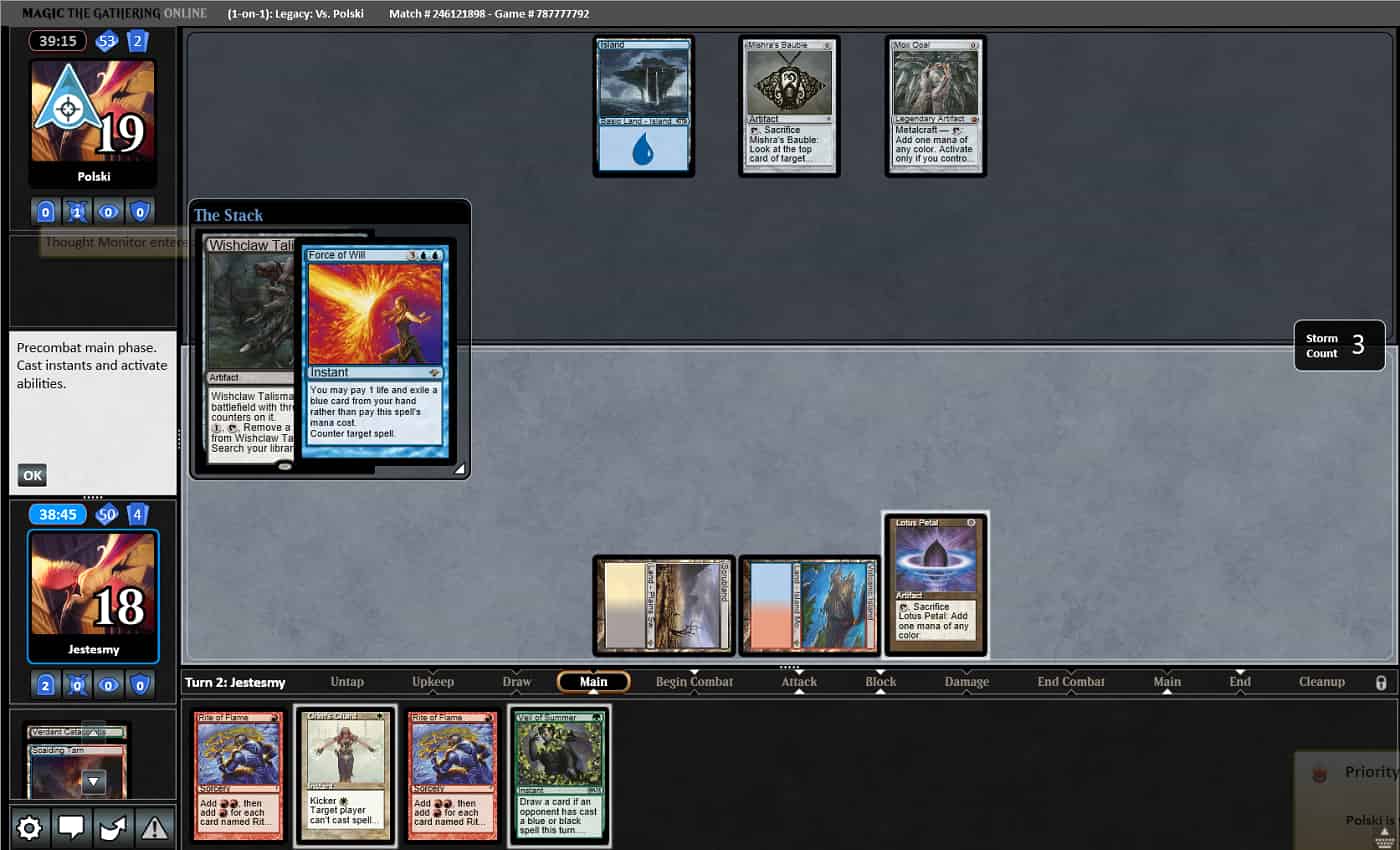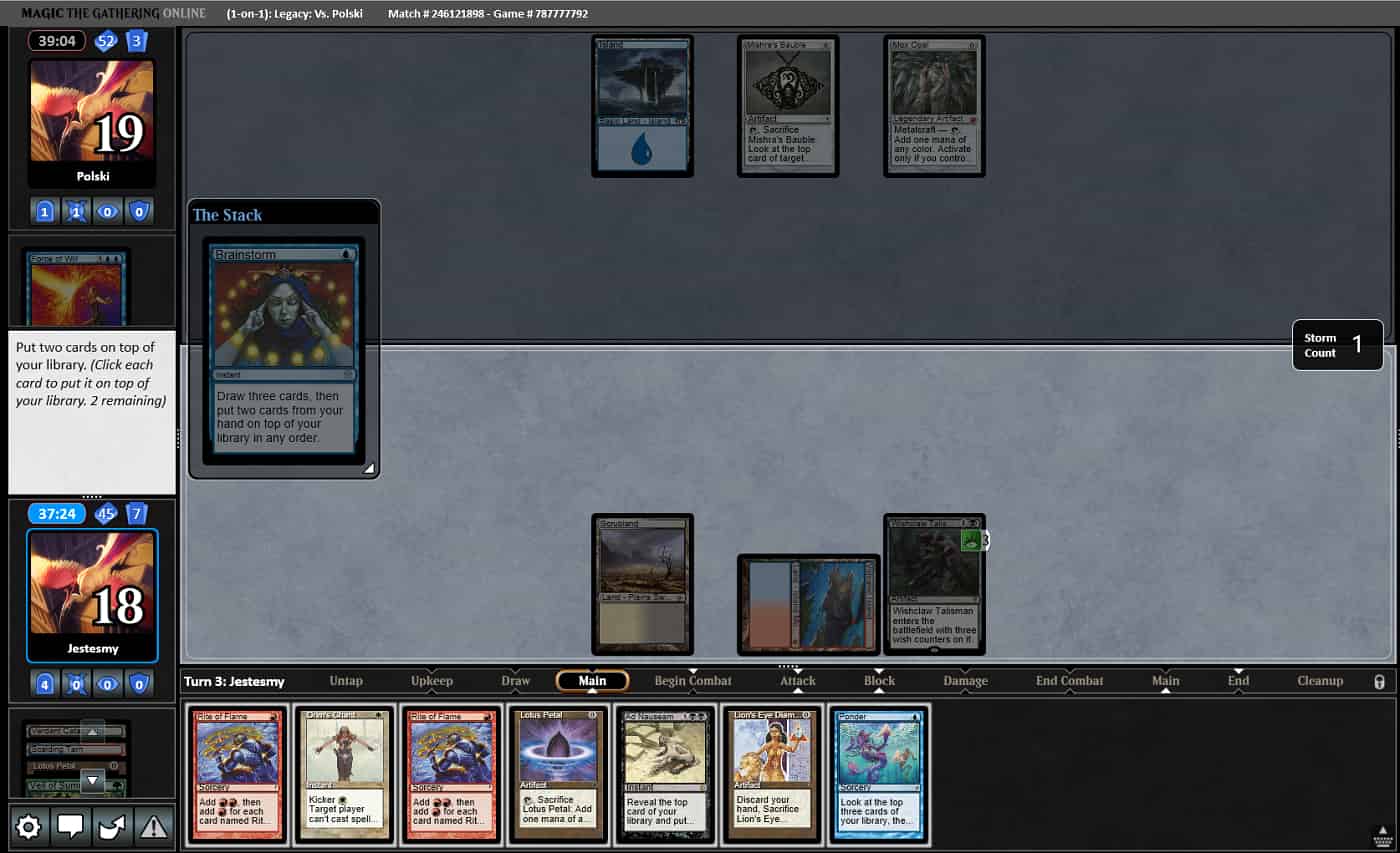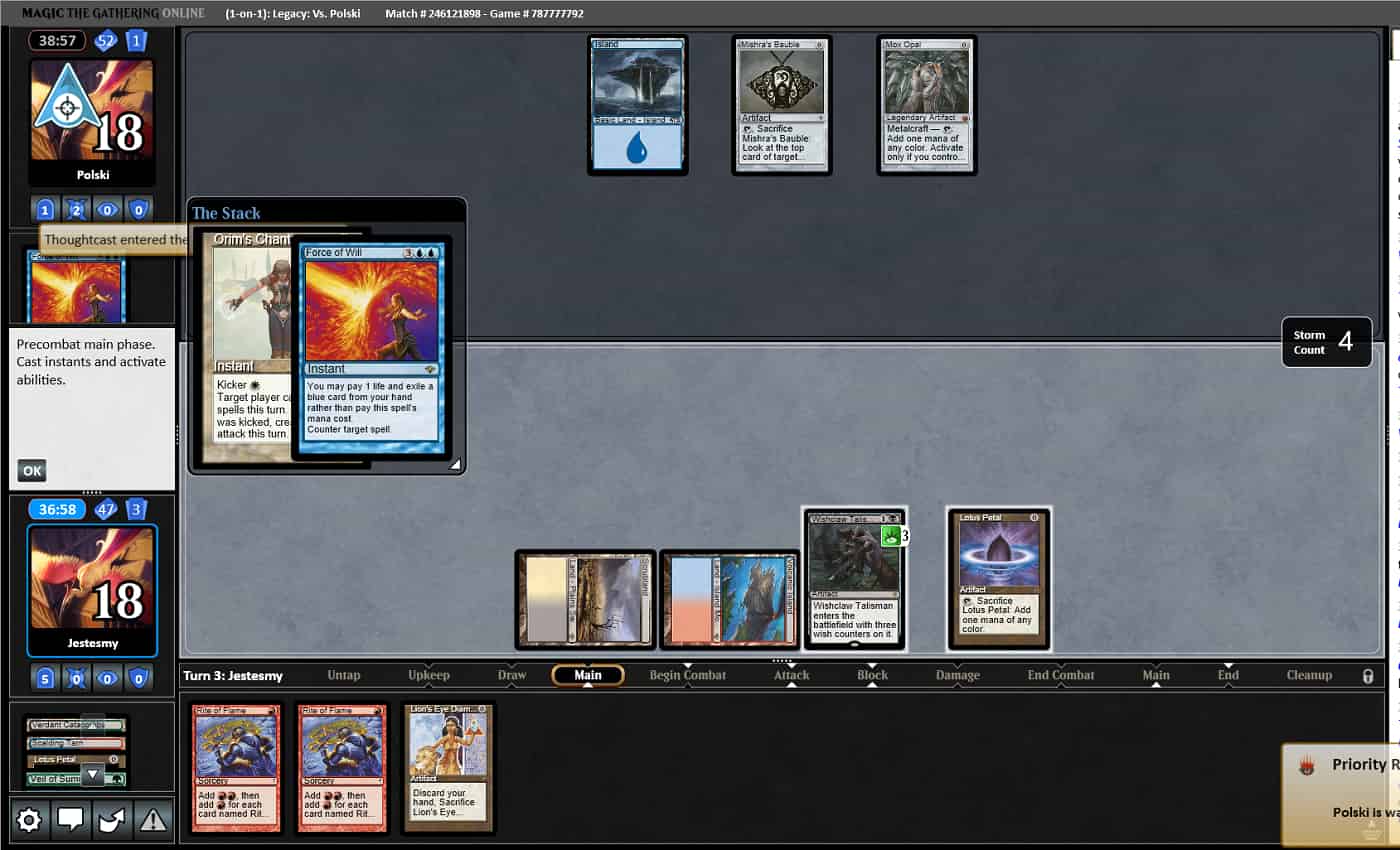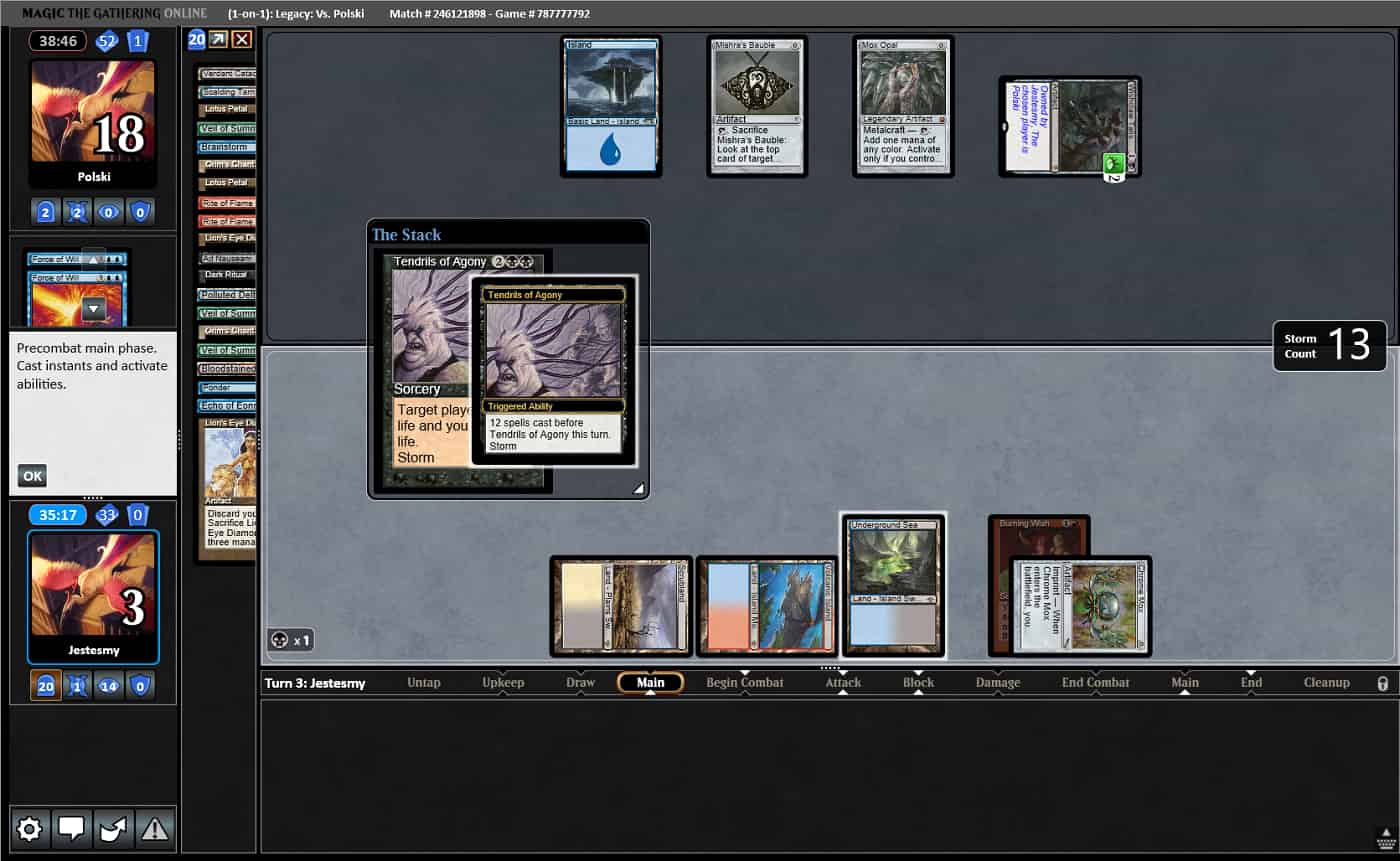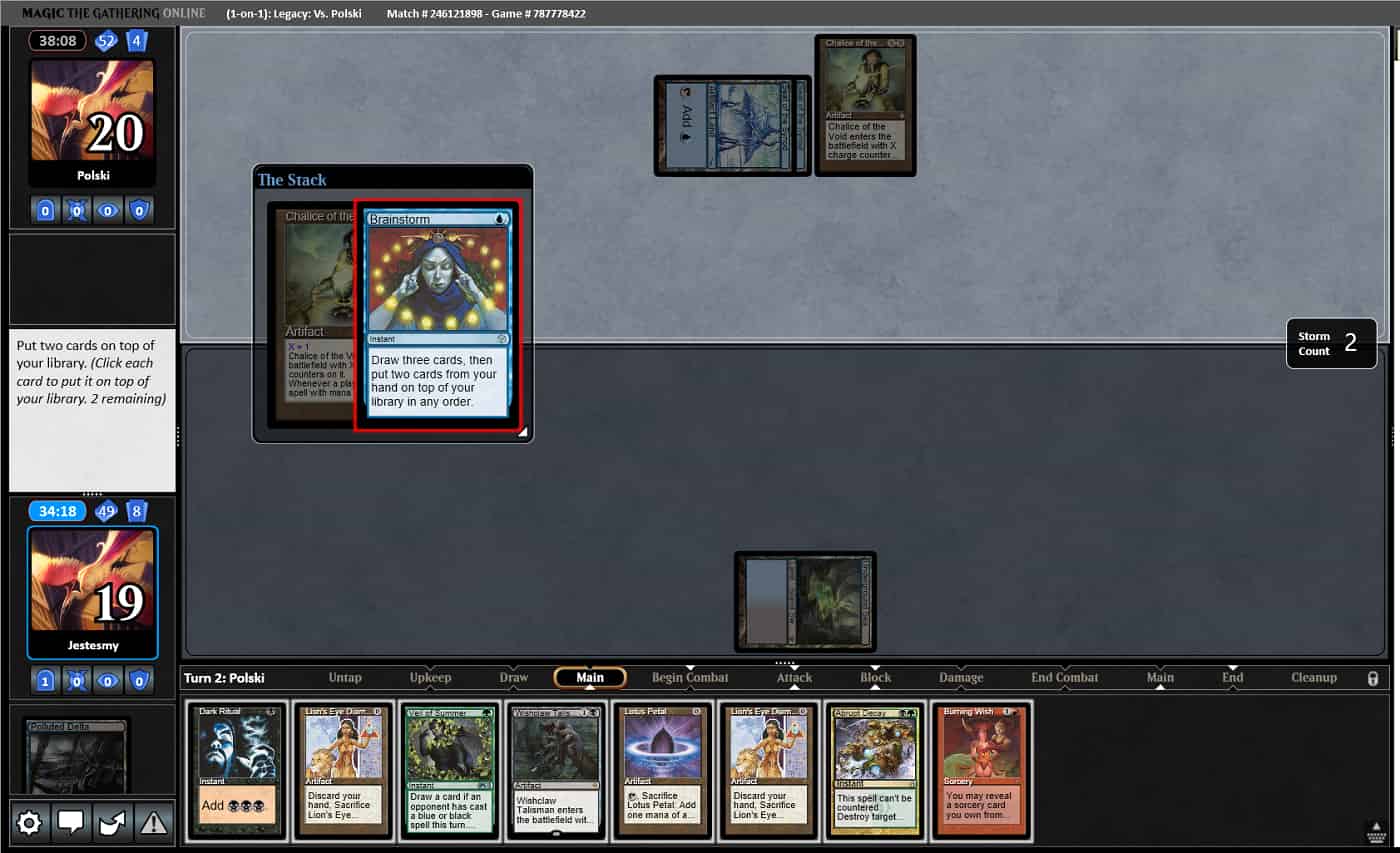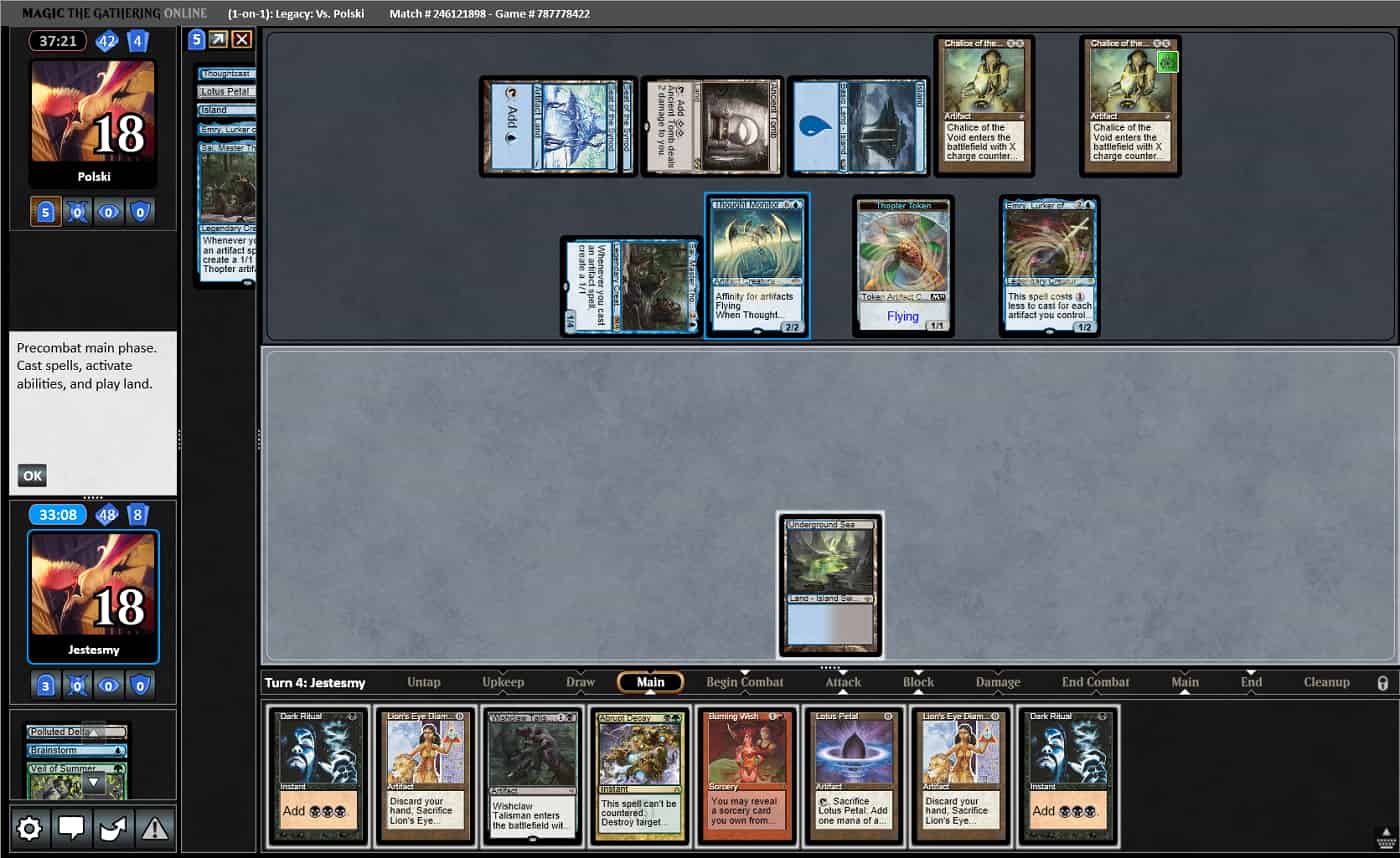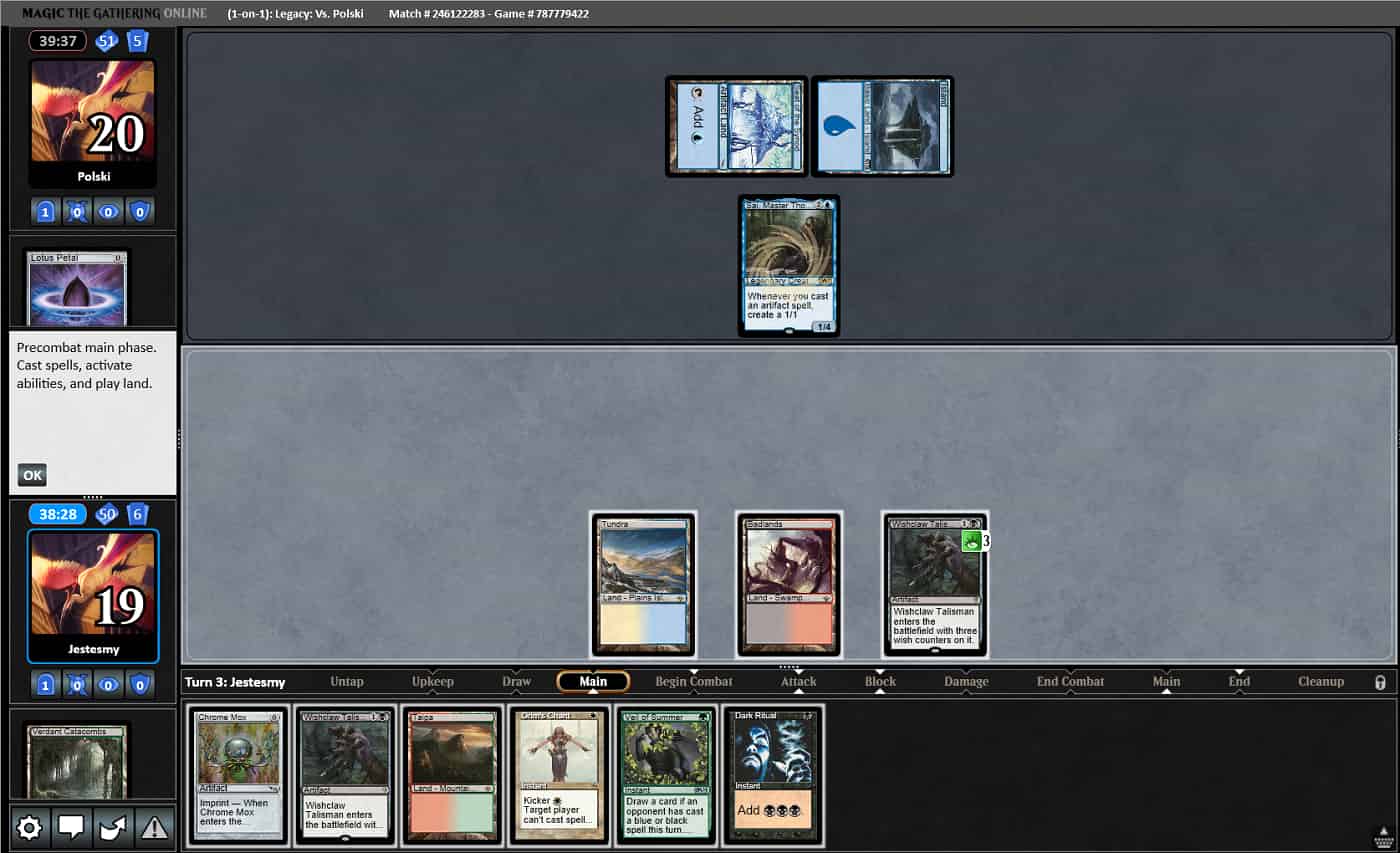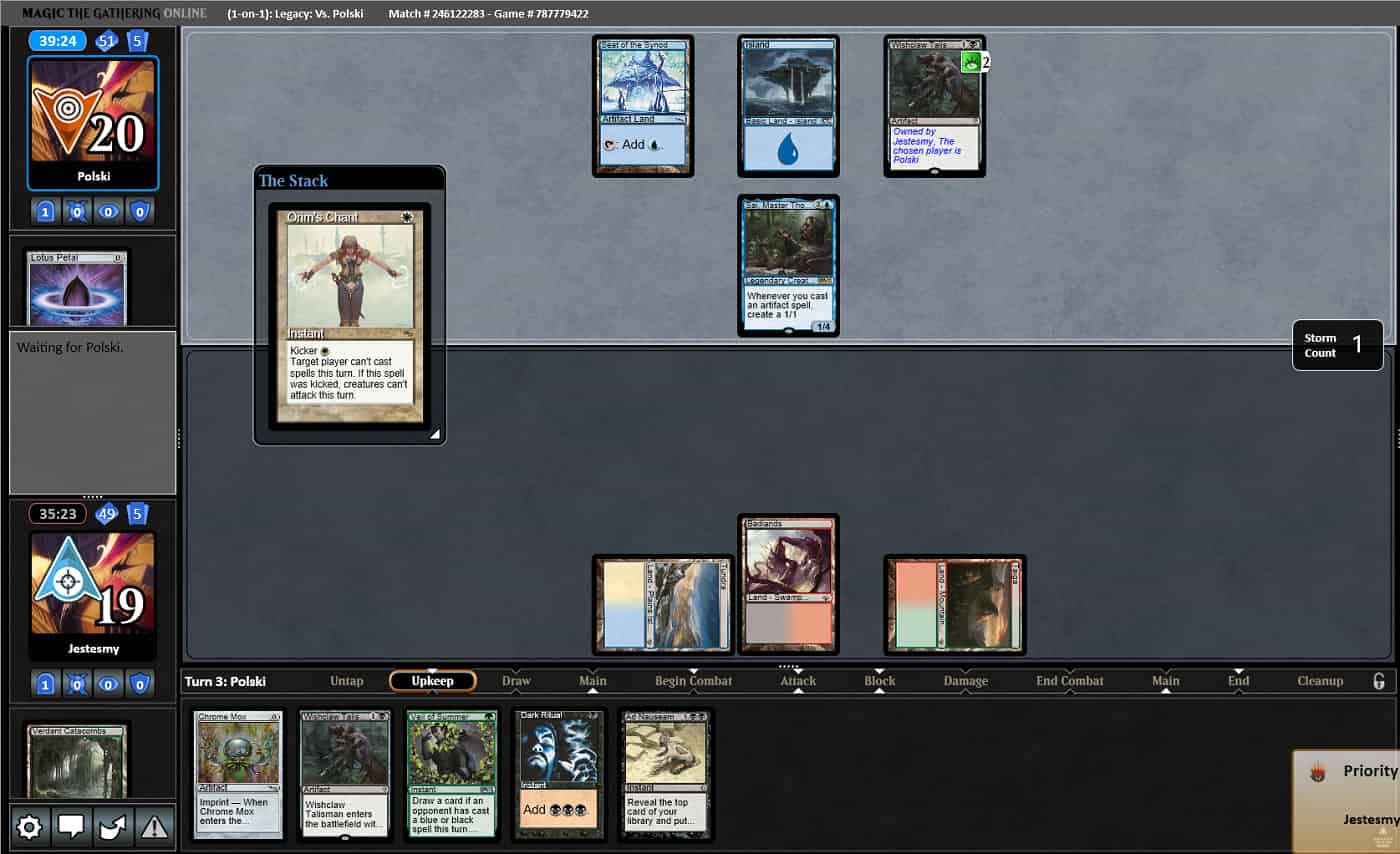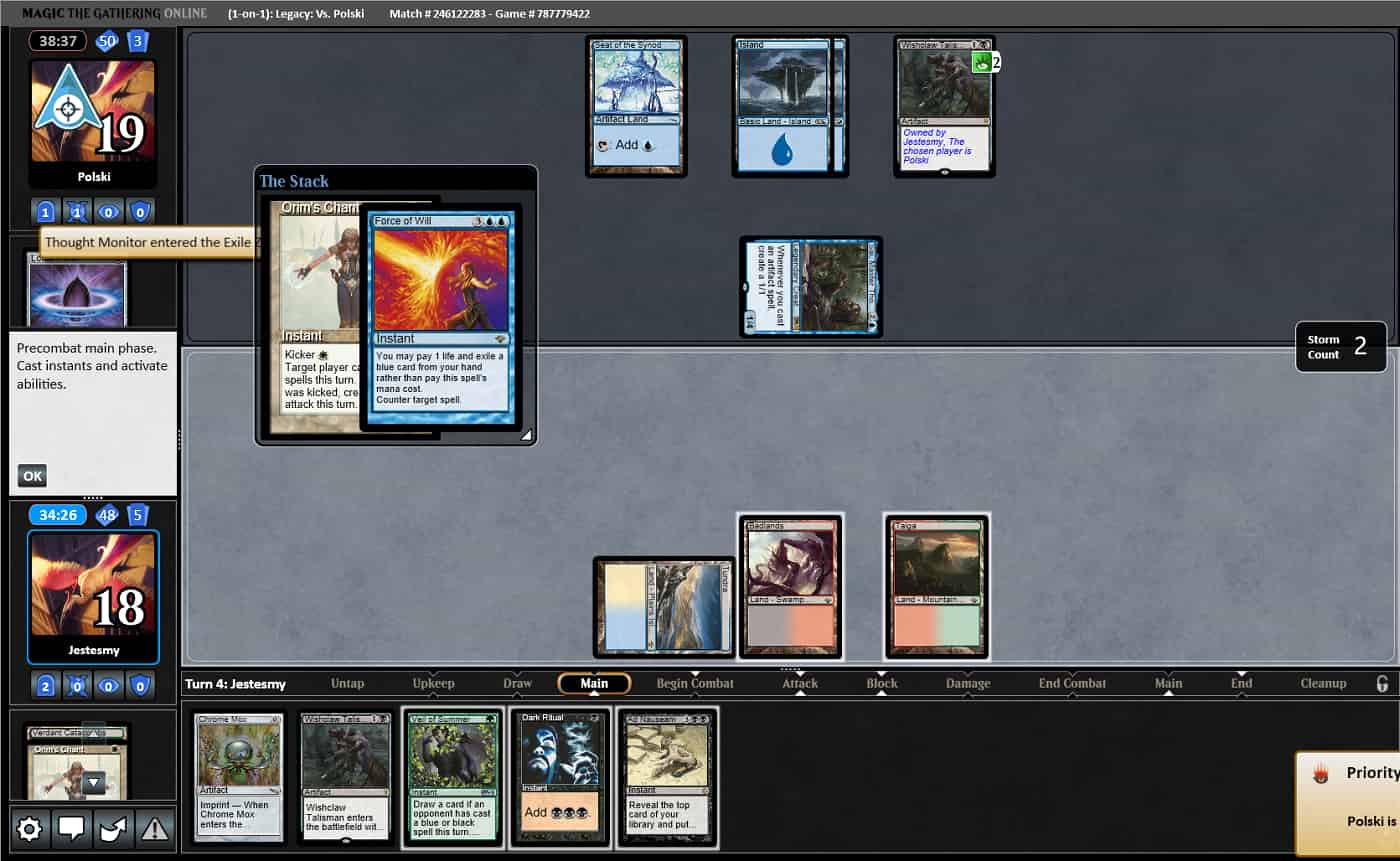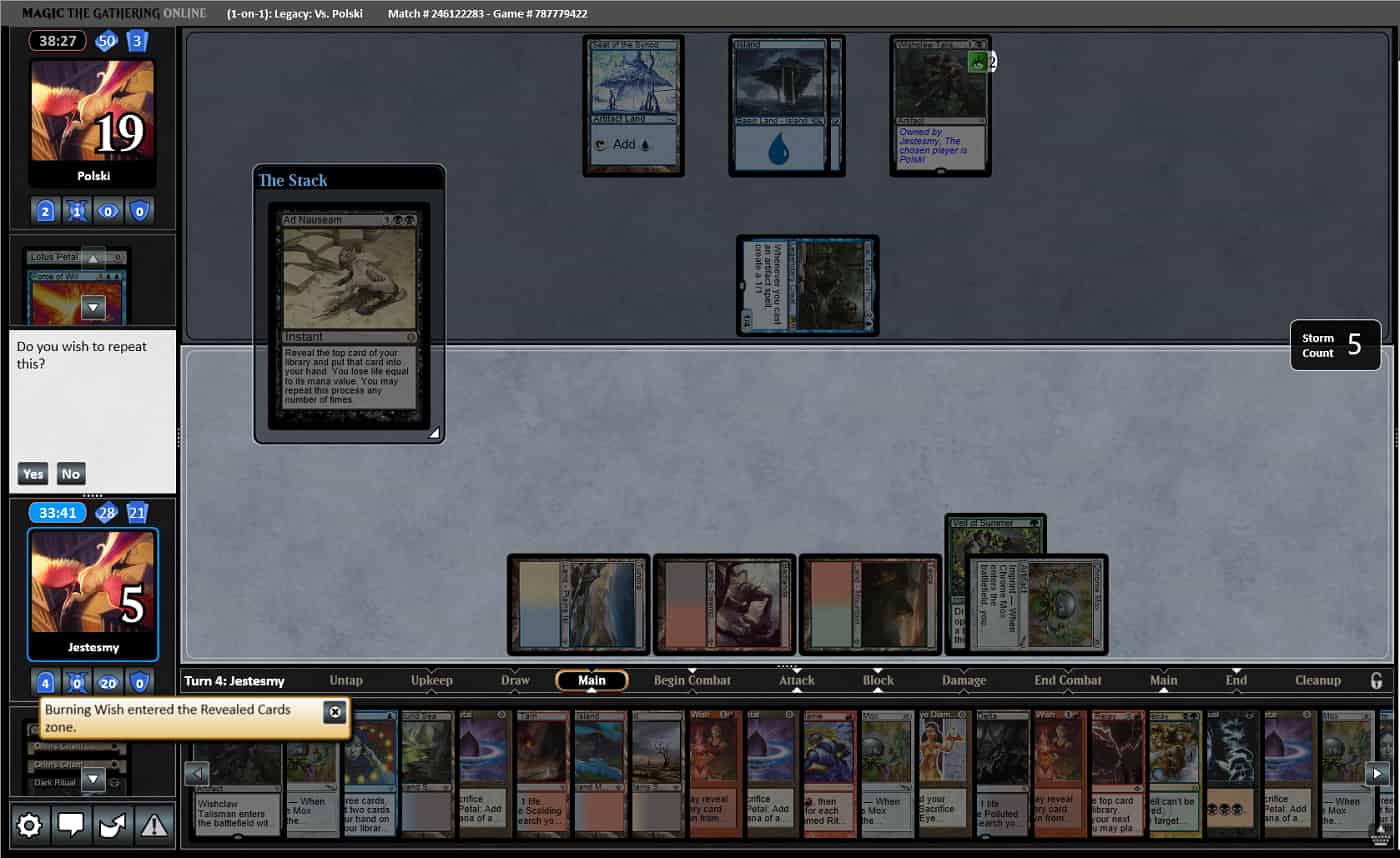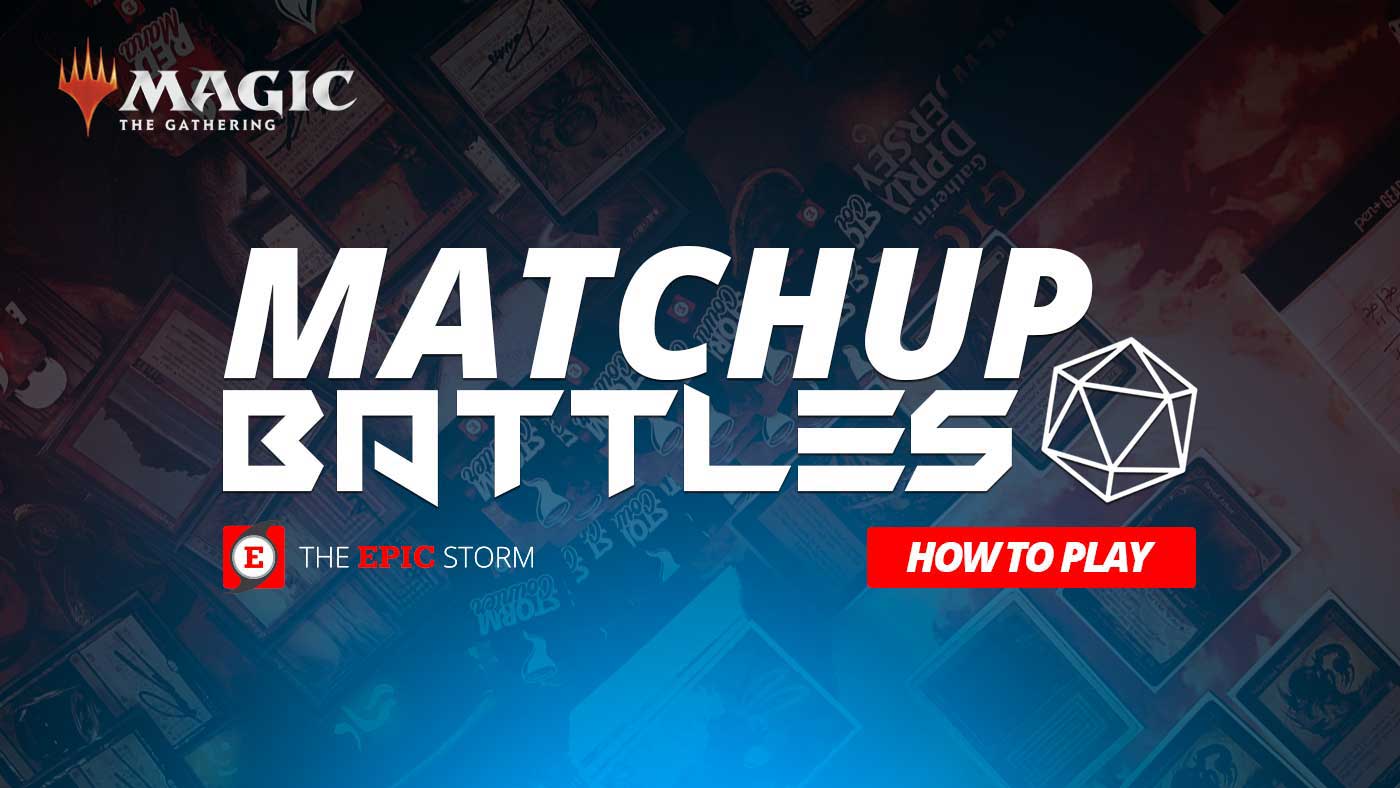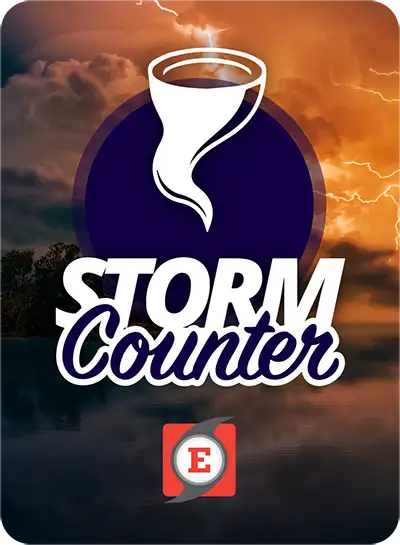8-Cast is the evolution of Karn Echoes. Both are mono-blue artifact based decks that play [[Force of Will]] and [[Chalice of the Void]]. The main differences is that Karn Echos played [[Karn, the Great Creator]] with [[Lion’s Eye Diamond]], a sideboard package, [[Echo of Eons]] and [[Hullbreacher]] to lock the opponents out of the game. 8-Cast doesn’t play the combos and plays more fairly with cards like [[Thought Monitor]] and [[Thoughtcast]]. That’s where it got the name eight casts. 8-Cast wins by trying to out card advantage the opponent by drawing more cards, using cards over with [[Emry, Lurker of the Loch]], and creating tokens with [[Sai, Master Thopterist]].
How does 8-Cast matchup against TES?
[[Urza’s Saga]], [[Pithing Needle]] – [[Urza’s Saga]] has become really popular in Legacy, and with good reason, because it is a powerful card. 8-Cast is looking to use [[Urza’s Saga]] as both a win condition with [[Construct Token]]s and tutor for disruption, like [[Pithing Needle]]. [[Pithing Needle]] can be disruptive against TES at stopping one of our best cards, [[Wishclaw Talisman]].
[[Chalice of the Void]] – Most [[Chalice of the Void]] decks are going to cast this for zero to try and turn off all of our artifact mana, but 8-Cast can’t do that as well because they also play many zero cost spells. Instead, 8-Cast is probably going to cast [[Chalice of the Void]] for one. This is tough to beat for TES, but it’s not nearly as backbreaking as zero.
[[Force of Will]], [[Force of Negation]] – It’s rare in Legacy to play both [[Chalice of the Void]] and [[Force of Will]] with [[Force of Negation]]. Usually, we only have to worry about one of those angles, but 8-Cast playing both adds a unique challenge. They usually play four copies of [[Force of Will]] in the main deck and several copies of [[Force of Negation]] in the sideboard. [[Chalice of the Void]] is usually split copies between main and sideboard.
Deck List
Main Deck
- 4 [[Burning Wish]]
- 4 [[Wishclaw Talisman]]
- 4 [[Brainstorm]]
- 4 [[Ponder]]
- 1 [[Ad Nauseam]]
- 1 [[Echo of Eons]]
- 1 [[Tendrils of Agony]]
- 4 [[Veil of Summer]]
- 2 [[Orim’s Chant]]
- 4 [[Rite of Flame]]
- 4 [[Dark Ritual]]
- 4 [[Lion’s Eye Diamond]]
- 4 [[Lotus Petal]]
- 3 [[Chrome Mox]]
- 3 [[Mox Opal]]
- 3 [[Verdant Catacombs]]
- 2 [[Scalding Tarn]]
- 2 [[Polluted Delta]]
- 1 [[Tropical Island]]
- 1 [[Badlands]]
- 1 [[Underground Sea]]
- 1 [[Scrubland]]
- 1 [[Taiga]]
- 1 [[Tundra]]
Sideboard
- 4 [[Galvanic Relay]]
- 2 [[Abrupt Decay]]
- 3 [[Prismatic Ending]]
- 1 [[Grapeshot]]
- 1 [[Empty the Warrens]]
- 1 [[Tendrils of Agony]]
- 1 [[Echo of Eons]]
- 1 [[Peer into the Abyss]]
- 1 [[Massacre]]
Ways to Win This Matchup
Our Game Plan
This matchup is about playing a very fine line. We want to go faster than the opponent can play a [[Chalice of the Void]] or use [[Urza’s Saga]] to make [[Construct Token]]s and tutor for disruption, but we also don’t want to try and combo carelessly into eight free counterspells.
The keys to winning this matchup is having some plan against a counterspell, either in the form of [[Galvanic Relay]], [[Orim’s Chant]], or [[Veil of Summer]], and winning around [[Chalice of the Void]]. The opponent can’t win in the first few turns of the game, so we have a few turns to try and
assemble a combination of cards to combo and beat their disruption. That is similarly true against all blue control decks, but the big difference is against control decks we can keep slower hands with several cantrips to try and sculpt that hand. Against 8-Cast we have to have it just naturally in our opening hand
or the top few cards of our deck. And we sideboard [[Ponder]] out, so I mulligan aggressively to get a better hand.
Sideboarding
-4 [[Ponder]], -1 [[Echo of Eons]] +2 [[Abrupt Decay]], +3 [[Galvanic Relay]]
This matchup mostly revolves around [[Chalice of the Void]], [[Force of Will]], and [[Force of Negation]], so that is what the sideboarding is based on. [[Chalice of the Void]] will almost always be set on one, because 8-Cast plays lots of zero mana artifacts, and one turns off our [[Veil of Summer]] and [[Orim’s Chant]] to protect against [[Force of Will]]. Because of [[Chalice of the Void]], we sideboard out [[Ponder]] and bring in [[Abrupt Decay]]. Since the opponent has up to eight free counterspells in the post board games, it’s a highly likely that they’re going to have one every game, so [[Galvanic Relay]] is really important to play through them.
Game Play
For the first game, I was on the play and kept a seven card hand with [[Wishclaw Talisman]], two lands, [[Lotus Petal]], two copies of [[Rite of Flame]], and an [[Orim’s Chant]]. My opponent mulliganed to six cards. On my first turn, I just played a land and passed. My opponent spent their turn playing an [[Island]], [[Mox Opal]], and [[Mishra’s Bauble]]. I then drew a [[Veil of Summer]] for my third turn, and played the [[Lotus Petal]]. My plan was to cast the [[Wishclaw Talisman]] with [[Veil of Summer]] for protection and then win on turn three with [[Orim’s Chant]]. The opponent had the [[Force of Will]] for [[Wishclaw Talisman]], but I used the [[Lotus Petal]] for [[Veil of Summer]], so it could resolve.

My opponent just drew a card and ended their second turn. On my third turn I had another [[Lotus Petal]] and a [[Brainstorm]] that I cast. The main card I drew was a [[Lion’s Eye Diamond]]. That would allow me to combo this turn and cast the [[Orim’s Chant]]. I put back the [[Ad Nauseam]] and the [[Ponder]].

I began my combo by casting [[Orim’s Chant]], which was immediately countered by [[Force of Will]]. The opponent had already used two copies of [[Force of Will]], so I didn’t want to play around a third and continued my combo.

I used the [[Lotus Petal]] to cast both copies of [[Rite of Flame]] and sacrificed the [[Lion’s Eye Diamond]] for black mana. This gave me enough mana to activate [[Wishclaw Talisman]] to search and cast [[Ad Nauseam]]. 18 life was more than enough to win the game.

1-0
I sideboarded like I recommendedm and we both started the second game on a mulligan to six. I keep a hand with [[Brainstorm]], some rituals, [[Veil of Summer]], and [[Wishclaw Talisman]]. My opponent spent their first turn playing a land and [[Chalice of the Void]] on zero. They usually don’t do this because their deck has so many zero mana artifacts, but they didn’t have any this game. My new plan was to [[Brainstorm]] on turn two and try to find either a fetchland to shuffle away the artifacts away or an [[Abrupt Decay]]. My opponent then played a [[Chalice of the Void]] for one on their second turn, and I had to cast [[Brainstorm]] right then. Unfortunately, I didn’t find a second land and knew my next two draw steps would be non-lands once I put two cards back.

During the two turns of drawing the same cards I put back, my opponent played several creatures and was putting on some pressure. I had one more draw step to try and draw a land, but unfortunately, it was [[Dark Ritual]] and I conceded.

1-1
For the third game, I keep a slower hand, but I have [[Wishclaw Talisman]], lands, and [[Orim’s Chant]]. I just played out the [[Wishclaw Talisman]] on my second turn. The opponent also kept a slower hand and just played a [[Sai, Master Thopterist]] off of [[Lotus Petal]] on their second turn. This indicated to me that they probably have at least one counterspell.

On my third turn, I drew a [[Dark Ritual]]. I now had access to six mana, which was enough to search for and cast [[Ad Nauseam]], but not with any protection. I thought the opponent would have a counterspell, so I didn’t want to go for that line. Instead, I decided to search for [[Ad Nauseam]] and give the opponent the [[Wishclaw Talisman]] and then [[Orim’s Chant]] on their upkeep. This will prevent the opponent from casting anything they drew for their turn or what they would tutor for.

The opponent then just played a land and passed the turn without activating [[Wishclaw Talisman]]. I drew another [[Orim’s Chant]]. Now, I could cast [[Ad Nauseam]] with protection, so I led off by casting the [[Orim’s Chant]]. It was immediately countered by the [[Force of Will]] I was expecting.

From there, it was an easy combo off casting the rituals into [[Ad Nauseam]] with 18 life, which was more than enough to draw enough cards to win the game.

8-Cast is a really interesting deck that I was excited to learn more about and playtest against. I’m not sure how long it will be around in Legacy though, because these style of decks tend to evolve pretty quickly. I do think, however, this version can hold its own in the metagame. I hope you enjoyed this article, can take some of the lessons learned, and apply them to your own playtesting.
